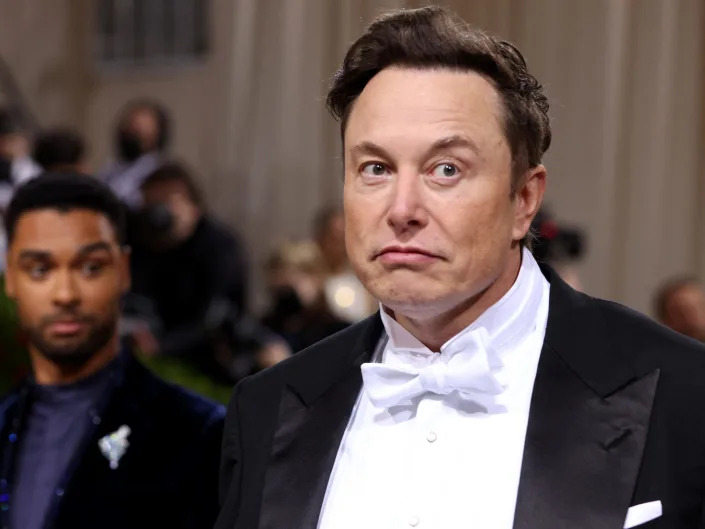21ST CENTURY ROBBER BARON
Elon Musk said working from home during the pandemic 'tricked' people into thinking they don't need to work hard. He's dead wrong, economists say.

Elon Musk said COVID-19 "tricked people into thinking that you don't actually need to work hard."
Working from home didn't make workers less productive, three economists told Insider.
The only constraint on productivity was when workers had children at home they needed to look after.
Elon Musk is not a fan of remote work.
In the early hours of Wednesday, Musk commented on a tweet which appeared to be an email from him to Tesla executive staff, saying: "Anyone who wishes to do remote work must be in the office for a minimum (and I mean *minimum*) of 40 hours per week or depart Tesla."
Although Musk didn't confirm the authenticity of the email, when asked whether such a strict in-office policy could be considered antiquated by some, he replied: "They should pretend to work somewhere else."
The tweets were not completely out of the blue.
Musk previously expressed distaste for American workers "trying to avoid going to work at all" in a May interview with The Financial Times — although he was contrasting them with workers in China, rather than comparing in-office and remote workers.
And he tweeted last month: "All the Covid stay-at-home stuff has tricked people into thinking that you don't actually need to work hard."
Musk, who railed against lockdown mandates and defied shelter-in-place orders to send workers back to his California Tesla factory in May 2020, might have the wrong idea about remote work. Insider spoke to three economists, all of whom said remote work during the pandemic did not damage worker productivity.
"Most of the evidence shows that productivity has increased while people stayed at home," Natacha Postel-Vinay, an economic and financial historian at the London School of Economics, told Insider.
"People spent less time commuting so could use some of that time to work, and they also got to spend more time with their family and sleeping, which meant they were happier and ended up more productive," she added.
Musk did not immediately reply when contacted by Insider outside of usual working hours.
Data shared with Bloomberg in February 2021 by VPN provider NordVPN Teams suggested that in many economies, working from home meant people worked longer hours.
Albrecht Ritschl, an professor of economic history, also said cutting out commuting was a bonus to worker productivity, and added that working from home led to fewer hours spent in "pointless meetings."
"Time spent at the office is not the same thing as working hard," Ritschl said.
Almarina Gramozi, a lecturer in economics at King's College London, said the largest surveys of workers in the US and the UK found workers were at least as productive at home as in the office — although she said a similar study in Japan found workers did report lower productivity working from home.
All three experts said productivity occasionally dipped in some cases, but not because people were shirking.
People with children at home during the pandemic often had to split their attention between work and childcare, leading to a decrease in productivity, Postel-Vinay and Ritschl said.
Gramozi also added productivity isn't just down to individual employees.
"Productivity levels depend substantially on the support that employers offer, technology adoption, and on the type of work that would allow it to be easily conducted remotely," she told Insider.
Elon Musk says recession is 'a good thing,' billionaires make people 'happy'
Bryan Ke
Mon, May 30, 2022
Elon Musk said in a series of tweets last week that it is “morally wrong and dumb” to use the word “billionaire” as a pejorative and that a possible recession is “a good thing” because it could affect unproductive work-from-home employees.
The comment about billionaires came after Musk, 50, opened a poll on Twitter on Friday and asked his 95.7 million followers who they trust less: politicians or billionaires. The results of the poll, which 3,399,953 people participated in, showed that 75.7% of respondents trust politicians less, while 24.3% of respondents trust billionaires less.
Who do you trust less? Real question.
— Elon Musk (@elonmusk) May 26, 2022
In another tweet on Friday, the Tesla and SpaceX CEO said it is “morally wrong and dumb” to use the word “billionaire” as a pejorative, adding, “If the reason for it is building products that make millions of people happy.”
Musk also tagged Rep. Alexandria Ocasio-Cortez (D-NY, 14) in one of the replies to his poll, daring the politician to start her own poll with her followers. The New York representative reportedly told Bloomberg earlier this month that she would like to replace her Tesla with an electric vehicle manufactured by workers who push for unionization, a process that Musk has expressed great disapproval of in the past.
“A union is just another corporation,” Musk tweeted on Friday. “Far better for many companies to compete for your skills, so that you have maximum optionality.”
“It has been raining money on fools for too long. Some bankruptcies need to happen,” Musk added. “Also, all the Covid stay-at-home stuff has tricked people into thinking that you don’t actually need to work hard. Rude awakening inbound!”
Replying to another Twitter user who asked how long the recession would last, Musk wrote, “Based on past experience, about 12 to 18 months. Companies that are inherently negative cash flow (i.e. value destroyers) need to die so that they stop consuming resources.”
Musk’s tweets came right after the World Economic Forum occurred in Davos, Switzerland, from May 22 to 26. During the event, several world leaders, CEOS, journalists, investors and others gather to discuss wide-ranging problems, from economy-related issues to climate change.

No comments:
Post a Comment